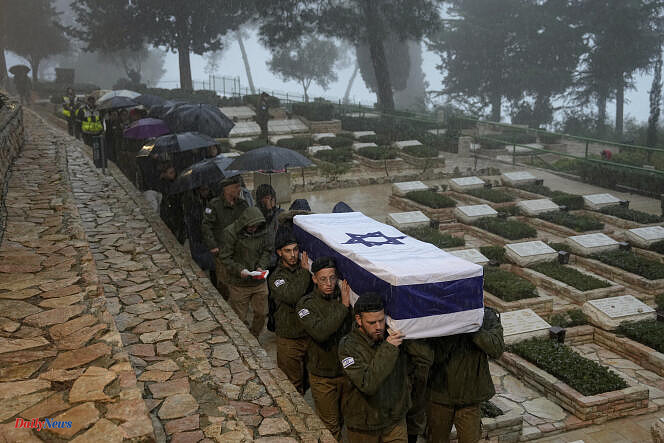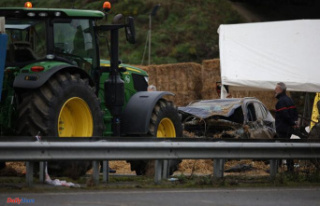Find here our situation update published yesterday
On the 109th day of the war, Israeli forces announced that they had “surrounded” Khan Younes, the hometown of Yahya Sinouar, the Gaza leader of the Islamist movement Hamas, considered the architect of the October 7 attack.
The continuation of the conflict and its human cost are increasing pressure on the Israeli government to negotiate a new truce with Hamas, and prepare for the post-war in the coastal strip.
Israel announced on Tuesday January 23 the death of 24 soldiers in Gaza the day before, its heaviest military loss in one day since the start of its ground offensive in the Palestinian territory.
According to Israeli army spokesman Daniel Hagari, 21 "reservists" died in the collapse of two buildings they were mining in the south of the Gaza Strip, after a rocket attack on a tank nearby. Three other soldiers also died in a separate incident.
Israeli Prime Minister Benjamin Netanyahu announced the opening of an investigation into this “disaster”, referring to “one of the hardest days” since the outbreak of war. Defense Minister Yoav Gallant also called the losses a “hard blow” to the Israeli army.
The health ministry in the Hamas-controlled Gaza Strip announced that "Israeli tanks are firing heavily on the upper floors of the surgery building and the emergency building of Nasser Hospital [ located in the southern Gaza Strip].” According to the ministry of the Islamist movement, which specifies that the transfer of patients to the nearby Jordanian military field hospital was made impossible by the bombings, “dozens of injured are expected.” Questioned by Agence France-Presse, the Israeli army did not immediately comment on these allegations.
The Israeli military operation has killed 25,490 Palestinians, the vast majority women, children and adolescents, since October 7, according to the Hamas health ministry. This assessment could not be independently verified.
Gaza is “threatened with imminent famine”, with food aid struggling to reach the Palestinian territory due to fighting and obstacles put up by Israeli authorities, the World Food Program (WFP) has denounced.
“Every day that passes we are, of course, moving towards an even more catastrophic situation,” said Abeer Etefa, WFP spokesperson for the Middle East during the regular UN briefing in Geneva. “More than half a million people in Gaza face catastrophic levels of food insecurity and the risk of famine increases every day as the conflict limits the delivery of vital food aid to those in need.” , underlined Ms. Etefa, by videoconference from Cairo.
In a statement, Lebanese Hezbollah said it targeted the Meron base in northern Israel using "a large number of missiles" in response to "recent assassinations and repeated attacks against civilians" in Lebanon and in Syria. Hezbollah had already announced that it had targeted this base on January 6, in retaliation for the elimination attributed to Israel of the number two of the Palestinian Islamist movement Hamas in Lebanon.
In recent weeks, Israel has been accused of carrying out several targeted strikes against officials from Iran and its allies in Syria and Lebanon who support Hamas: on Saturday, 13 people, including five advisers to the Iranian Revolutionary Guard , were killed in Damascus in an airstrike blamed on Israel, according to the Syrian Observatory for Human Rights (OSDH). On January 8, Hezbollah announced the death of Wissam Tawil, described as “a commander of the Al-Radwan force.” On January 2, Hamas number two Saleh Al-Arouri and six other executives of the Palestinian movement were killed. killed in drone strikes, attributed to Israel, in the southern suburbs of Beirut, a stronghold of Hezbollah.
Brett McGurk, Joe Biden's Middle East adviser, "is in Cairo" on Tuesday and will make other stops in the region, and "one of the things he's discussing is the potential for a new liberation deal hostages, which would require a humanitarian pause of some duration,” said John Kirby, a spokesman for the National Security Council. He described the discussions as “serious.”
Some 250 people were kidnapped and taken to the enclave by Hamas. Around a hundred were released at the end of November as part of an exchange for Palestinian prisoners, after negotiations carried out through Qatar, and in which the United States actively participated. According to Israel, 132 hostages are still held in the territory, of whom 28 are believed to have died.
According to the American news site Axios, Israel offered Hamas, via the mediation of Egypt and Qatar, a two-month pause in military operations in Gaza for an exchange between Palestinian prisoners and all the hostages, alive. and deceased.
After a second round of US-British strikes carried out overnight against Yemeni rebels, Rishi Sunak, the British prime minister, said the UK "will not hesitate to respond further" to Houthi attacks, "in legitimate defense ".
Yemeni Houthi rebels have warned that they will respond to new US-British strikes carried out overnight against their positions in Yemen, against a backdrop of escalation linked to the conflict between Israel and Palestinian Hamas. Many shipowners now avoid these key areas for international trade.












